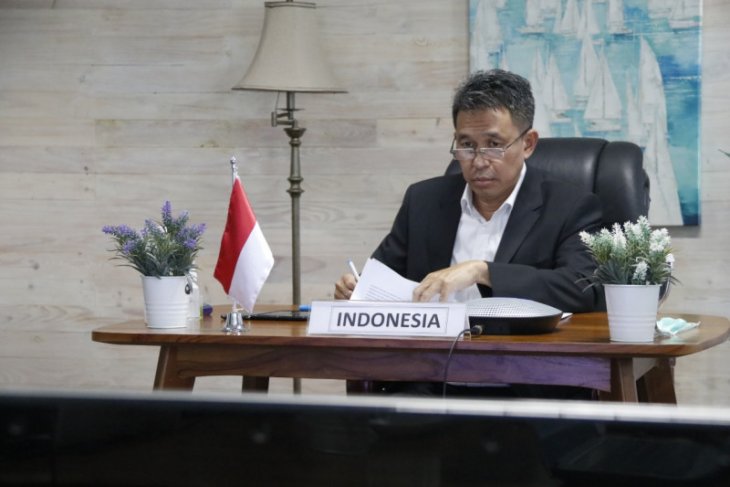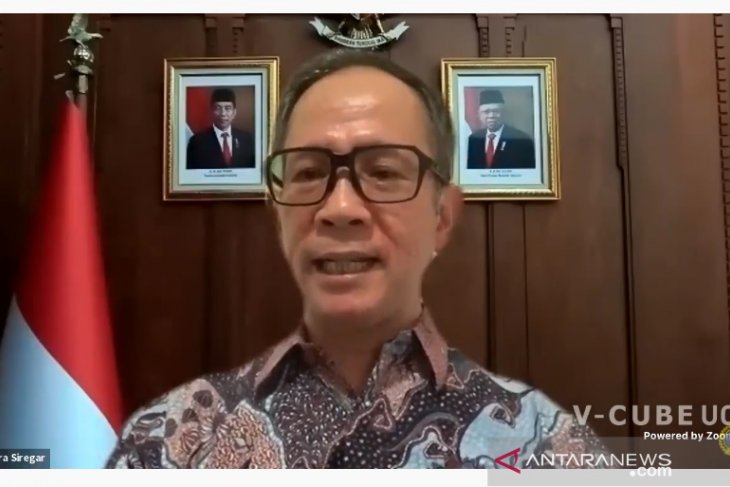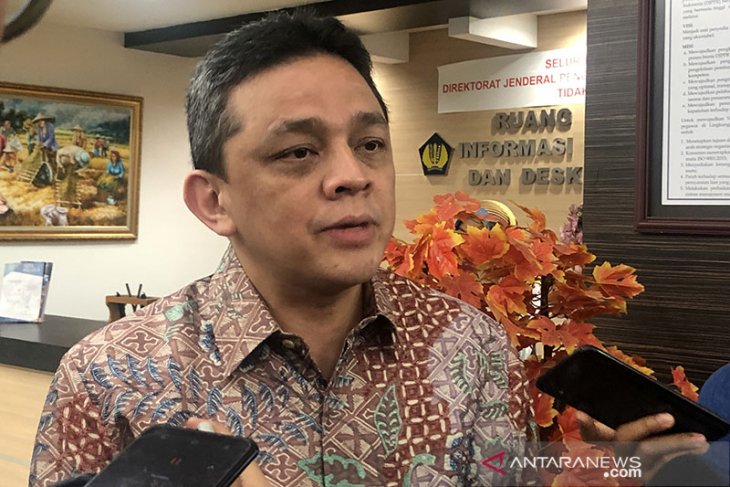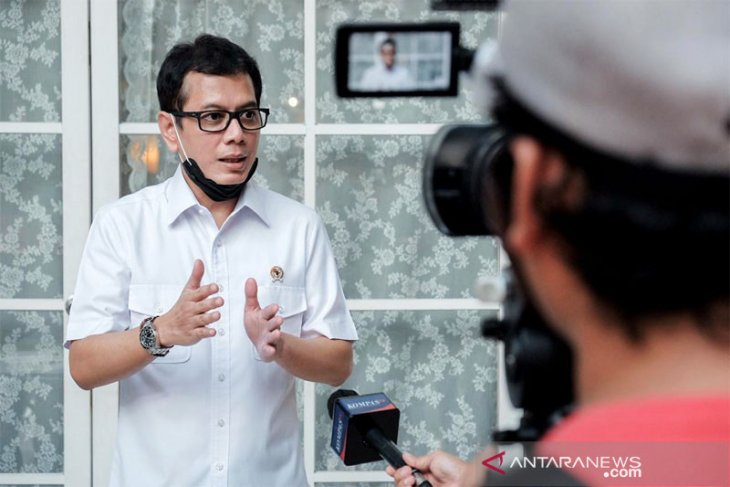Live Streaming
Program Highlight
Company Profile
August
West Sumatra's Pieh Island Declared Sea Mammal conservation area
Written by Ani Hasanah
Director general of marine spatial management at the Marine Affairs and Fisheries Ministry, Aryo Hanggono. (ANTARA/HO-KKP)
The Marine Affairs and Fisheries Ministry has declared Pieh Island in West Sumatra as a conservation area and migration route for sea mammals.
"Conservation of sea mammals’ habitat and migration route has been established in some areas, including at the Marine Tourism Park (TWP), Pieh Island," the ministry's director-general of marine spatial management, Aryo Hanggono, said in a statement in Jakarta on Saturday.
Hanggono said Indonesia has at least 33 species of cetaceans (whales and dolphins), or over a third of the total cetacean species found in the world.
The infraorder Cetacea is a key component in the food chain, along with other major predators, hence, any disturbance in its population affects the entire food chain, he noted.
"Considering these roles, we need to protect and preserve the existence of Cetacea, especially in Indonesian waters," he added.
The ministry has issued a ministerial regulation (no. 79/2018) on the national action plan for sea mammals in 2018-2022, which is aimed at protecting sea mammals, maintaining their stable population, and developing sustainable economic benefits from the species.
Head of the National Marine Conservation Area (LKKPN), Fajar Kurniawan, said sea mammals in Pieh Island have become a focus of conservation, in addition to coral reefs and turtles.
Data on sea mammal appearance in the last five years will be used as a basis for their management in the area, according to officials. (ANTARA)
August
Foreign Ministry to Incorporate Batik Subject in Diplomatic Education
Written by Ani Hasanah A screenshot of Vice Foreign Minister Mahendra Siregar during a virtual seminar "Batik: Cultural Heritage and Creative Economic Asset of Indonesia" held at the Foreign Ministry on Friday (Aug 28, 2020). (ANTARA/Suwanti)
A screenshot of Vice Foreign Minister Mahendra Siregar during a virtual seminar "Batik: Cultural Heritage and Creative Economic Asset of Indonesia" held at the Foreign Ministry on Friday (Aug 28, 2020). (ANTARA/Suwanti)
The diplomatic education curriculum will feature batik as a subject as part of the Foreign Ministry’s endeavors to strengthen and sharpen Indonesian batik diplomacy abroad, Vice Foreign Minister Mahendra Siregar stated.
"Batik subject will especially be included in the module or curriculum of diplomatic education," he remarked during a virtual seminar "Batik: Cultural Heritage and Creative Economic Asset of Indonesia" held at the Foreign Ministry on Friday.
"That has become (our) commitment, and a team of the education and training center along with experts are in the process of drafting it," he noted.
The Foreign Ministry has, since long, introduced batik in foreign countries. In 2008, Indonesia had launched a campaign to rally support for the nomination for batik's inscription into UNESCO's Representative List of the Intangible Cultural Heritage of Humanity.
UNESCO officially declared batik as an intangible cultural heritage on October 2, 2009. National Batik Day has been observed annually ever since.
In the run-up to the 11th National Batik Day, the Foreign Ministry has been readying several activities to intensify batik promotion since batik is an integral part of the Indonesian diplomacy.
"We would like to strengthen and sharpen an integrated promotion or marketing program. Although we have, so far, conducted promotion programs, they are sometimes incidental," he stated.
“The ministry will also directly contribute to responding to the needs of Indonesian batik producers and craftsmen in the wake of the pandemic," Siregar noted. (ANTARA)
August
Finance Ministry Underscores Three Focuses to Address COVID-19 Impacts
Written by Ani Hasanah
Director-General of Financing and Risk Management of the Finance Ministry Luky Alfriman. ANTARA/Astrid Faidlatul Habibah/pri.
Director-General of Financing and Risk Management of the Finance Ministry Luky Alfriman drew special attention to the three major focus areas of the government's agenda to address the impacts of the COVID-19 pandemic.
"The government is present to ensure that the economy is healthy, and the people are still in good health," he noted at an online discussion in Jakarta on Friday.
The first emphasis of the government's agenda is to maintain the health sector since the number of COVID-19 cases in Indonesia has shown a steady rise to reach up to 162,884 until Thursday (Aug 27), he stated.
The second area of priority is to maintain the purchasing power of the public, especially those from the middle- to the low-income group. To this end, the government has launched several stimuli as part of the national economic recovery (PEN) Program, he remarked.
The third focus remains on ensuring that activities of the business world continue to run in the wake of the COVID-19 pandemic. To this end, the government has provided various incentives as part of the PEN Program, he revealed.
"We do not want to see bankruptcy or layoffs," he affirmed.
Alfriman remarked that the COVID-19 pandemic has had an extraordinary impact on the national economy, with economic growth in the second quarter recording a contraction of up to 5.32 percent.
However, the figure is lower than those of Great Britain and Spain that touched minus 21 percent, while those of the Philippines, Malaysia, and Singapore reached minus 10 percent.
"It (the contraction) was clocked in almost all components. The growth of household consumption, investment, exports, imports, and government consumption contracted in the second quarter," he remarked.
The three focus areas that need the government’s stimuli have raised spending, while state revenues had come under pressure, leading to a fairly large deficit of 6.34 percent of the gross domestic product. (ANTARA)
August
Minister Draws Attention to Challenges Facing MSMEs to Go Global
Written by Ani Hasanah
Tourism and Creative Economy Minister Wishnutama Kusubandio. ANTARA/HO-Press Bureau of the Tourism and Creative Economy Ministry/Hanni Sofia/am/sh
Tourism and Creative Economy Minister Wishnutama Kusubandio shed light on the various challenges facing micro, small, and medium-scale enterprises (MSMEs) in the creative industry to penetrate the global market.
"(The challenges) pertain to logistics, documentation and administration, and high export-fees. The creative industry is dominated by MSMEs, and not all of them understand the process to export," Kusubandio stated during the Indonesia Creative Works 2020 Exhibition in Jakarta on Friday.
Other problems faced by MSMEs are the limited production capacity, lack of production machinery, and market information for their products, coupled with their lack of confidence in entering the export market.
"They do not have the digital marketing ability or e-commerce platform for exports and consequently have to bear high costs," Kusubandio stated.
Several operators in the creative industry have encountered difficulties in obtaining raw materials during the imposition of Large-Scale Social Restrictions (PSBB) since some of the basic materials were imported.
"The enforcement of PSBB has disrupted the distribution of logistics, and this has increased the delivery time," he stated.
On the other hand, the industry's revenue has declined with the drop in consumer demand, while capital loans cannot be easily accessed.
In its efforts to solve the problems, he affirmed that the ministry had selected some MSMEs to partake in the online promotion to the international market and had created a special directory of creative products to be distributed to all Indonesian representatives abroad.
The ministry has also worked closely with all stakeholders to provide stimulus and capital loans to creative industries and had cooperated with the market place.
Kusubandio believes that the industry should derive the necessary momentum presented by the COVID-19 pandemic to accelerate the digitalization process using the e-commerce platform.
In May 2020, the government had launched the national campaign, bearing the hashtag #BanggaBuatanIndonesia (Proud of the Indonesian Products), to promote products made in Indonesia.
Since the launch of the campaign, as of August 15, some 1.6 million MSMEs have entered the digital ecosystem.
Based on data of the Cooperatives and SME Ministry, the number of MSMEs in 2018 had reached 64 million, of which only 13 percent, or some eight million, have been digitalized. (ANTARA)


